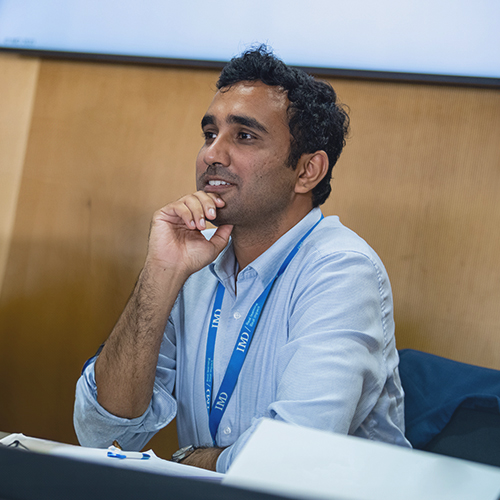
Putting boardroom gender balance plans to the test
Take our quiz to see if you're well-placed to implement new European rules on boardroom equality....
Audio available

by Natalia Olynec Published 28 December 2023 in 2024 trends • 18 min read
 What will 2024 bring for you and your business? IMD faculty and other experts offer their predictions for the year ahead.
What will 2024 bring for you and your business? IMD faculty and other experts offer their predictions for the year ahead.
In the dynamic business landscape of 2024, future-ready firms will position sustainability at the core of corporate strategy. Sustainable business models, where profitability converges with societal impact, will drive entrepreneurship and innovation. Simultaneously, regulatory shifts are redefining legal drivers, compelling enterprises to not just comply but lead in the era of responsible corporate conduct.
Collaboration, transcending traditional boundaries, will stand as an essential key to progress. Industries, governments, and civil society will forge alliances to address the multifaceted challenges of sustainability, propel innovation, and disseminate best practices. China’s ascent as an innovation hub in sustainability underlines the global nature of this transformation, with implications that extend far beyond regional borders. The COP28 United Nations Climate Change Conference in Dubai and wars and political turbulence around the world have stressed the need for firms’ engagement in shaping non-market environments and managing geopolitical risks.
Alongside these trends, a growing focus on inner development underscores that leadership rooted in personal growth can catalyze organizational success. Executives championing sustainability in their personal values foster a corporate culture of responsibility. Furthermore, the recognition of mental health at work has become a critical consideration, acknowledging the interdependence between employee well-being and sustainable, high-performance organizations.
As these trends unfold, management teams and boards of directors find themselves at the helm of profound transformations. Understanding and navigating these trends is pivotal for businesses seeking resilience and relevance. It is not just a competitive advantage; it is the key to building a legacy of positive impact and enduring success in a complex and interconnected global marketplace. In this context, IMD experts have identified a series of sustainability trends that will drive business priorities and transformation.
Over the past decade, stakeholder pressure on CEOs to take public positions on key social and political issues has transformed the requirements for the top job. According to Edelman, a public relations firm, three out of four respondents to the company’s annual Trust Barometer survey expect CEOs to weigh in on issues ranging from climate change to inequality and the discrimination of minorities, regardless of how closely linked they are to the company’s business.
In the aftermath of Russia’s invasion of Ukraine in 2022, 59% of respondents felt that this need to take a stance extended to key geopolitical issues, Edelman found. Other research shows that both customers and employees are more loyal to a company if the CEO takes positions that match their values.
However, many CEOs have been hesitant to assume this more public role, in part because taking a firm position on an issue always carries the risk of alienating stakeholders who disagree. Indeed, several empirical studies have shown that so-called “CEO political activism” tends not to change many opinions. Rather, it is a signaling tool.

From ESG compliance to competitive advantage.
2024 may well be the year in which this hesitancy swings toward outright reluctance for many CEOs. Following Hamas’ attack on Israel on October 7, 2023, many CEOs have struggled to find their voice. Stakeholder blowback against CEOs for taking one side in the conflict, for not taking a side, or for not taking a particular side forcefully enough has shown how difficult it is to navigate issues with extreme polarization.
When I asked CEOs during a recent IMD CEO Circle dialogue how the amount of time they spend on politics compares to five years ago, more than 80% said they spent at least twice much time. Don’t expect that to go away, even if CEOs use their pulpit more cautiously.
Momentum is growing in favor of nature-positive corporate strategies. In 2024, over 50,000 companies will face new regulatory disclosure requirements on the impact their operations have on nature, in light of the EU’s Corporate Sustainability Reporting Directive coming into force. The following years will cover even more companies, including SMEs. Anticipating this, some leading brands are seizing the initiative by going beyond simply reporting their impact.
Many are preparing the first set of nature-related targets with the Science-Based Targets Network, with a full roll-out planned for all companies by early 2024. Yet accurately reporting and meeting nature-related targets will require ever more nature-related data, and decision-making will require nature insights. New technologies such as environmental DNA, earth observation, and acoustic and imaging technology as well as artificial intelligence will increasingly fill this gap. Companies needing to be efficient in the collection and analysis of nature-related data may turn to emerging companies specializing in such ‘nature intelligence’.
Companies’ relationships with stakeholders are changing. Consumers are demanding more equitable products and new talent is looking for ways to combine business acumen with a sense of purpose. Communities where organizations operate – neighborhoods, villages, cities, regions – are voicing feedback on companies’ actions.

These changes in stakeholder relationships demand authentic social engagement, yet true societal impact is not easy to achieve. As a result, companies tend to resort to simple solutions, such as writing checks, donating goods, or meeting minimal environmental standards. While short-term measures may feel like quick wins, they come at a cost – and expose companies to a number of risks, from accusations of greenwashing and loss of reputation to employee attrition and alienation from the community. Companies need to act now to seize opportunities for collaboration and growth and stay ahead of the curve.
When IKEA Belgium opted to back housing for single-parent families, IKEA decided to partner with a group of community actors and non-profits. IKEA combined its know-how with the expertise and resources of various local stakeholders already working in the affordable housing space. The result: more effective and long-term positive impact.
For many firms, the quest for better governance has led to a transformation of the board, encouraging board diversity. For example, according to the Deloitte and the Alliance for Board Diversity 2022 report, underrepresented groups have more participation than ever on the boards of the Fortune 100 and Fortune 500 – reaching a high of 46.5% and 44.7%. Business consultants and advisors often assume that this leads to superior environmental performance, but the research in this area is inconclusive and contradictory.
Our recent study of 3,483 listed firms globally concludes that firms with more diverse boards do not walk their environmental talk. My co-authors and I analyzed a large sample of firms in 58 countries over a 19‐year period and found that firms with more diverse boards had greater discrepancies between green communication and green practices. In other words, they greenwash more than others. Meanwhile, some of the top firms, including Amazon, Intel, Twitter, Wells Fargo, and Nike have had the largest layoffs in their diversity teams this year. I think we will see people looking more closely at diversity in the boardroom, and a more nuanced understanding of the factors at play.
Organizational leaders are facing a global societal challenge with burnout and workplace stress on the rise, and 92% of workers who seek to work for an organization that values their well-being. With the majority of the population spending up to 30 years in the workforce, creating practices that help employees sustain productivity and well-being is critical. Employers are taking note: 87% of companies are implementing at least one human sustainability initiative to support the collective well-being of workers such as flexible work arrangements and mental health support programs.
The varying success of current initiatives highlights directions for improvement. First, initiatives need to be embedded in a supportive corporate culture that is stewarded by leaders who act as allies. Second, personalizing mental health support such as burnout prevention and stress recovery will increase the effectiveness of solutions to the root concerns, enabled by employee voice, scaled by AI, and evidenced by research.

Manage social, political, and regulatory dynamics to accelerate your sustainability transformation.
In China, the ESG concept, while Western in origin, has been embraced with a distinct approach that aligns with the nation’s “common prosperity” and “dual drivers” ethos. The government’s ambitious 2060 carbon-neutralization targets have spurred industries to innovate and commit. For instance, CATL, a leader in the EV battery market with a 37% global share in 2022, achieved a 25% reduction in greenhouse gas emissions intensity within a year and initiated a recycling program with over 99.3% recovery of materials from spent batteries. CATL’s sustainability efforts extend to its supply chain, with audits ensuring ESG principles are upheld. This is part of a larger trend, with China aiming to significantly increase non-fossil energy consumption by 2060. Companies like CATL are not just adapting to but driving this change, illustrating a model where government vision and market innovation intersect to champion sustainability.
In 2023, when ISSB Chairperson Emmanuel Faber called the EU’s double materiality approach “ambitious but not realistic,” it received strong support and equally enthusiastic disapproval across companies, geographies, and experts. Faber’s pragmatism was appreciated by supporters of the view that ISSB’s (US-based) financial materiality, i.e., information most relevant to investors, is indeed the most important lever to drive sustainability transformation. Whereas naysayers fervently pointed out that the Corporate Sustainability Reporting Directive (CSRD) (EU-based) double materiality approach provided a holistic view of the sustainability performance by accounting for all stakeholder impacts that the company creates from both a financial and non-financial perspective. A trend to watch out for is an initial divergence and eventual convergence of the two seemingly disparate materiality standards, as companies undertake either CSRD-led or ISSB-led sustainability reporting, starting in 2024.

“For many firms, the quest for better governance has led to a transformation of the board, encouraging board diversity.”- Ivan Miroshnychenko, Research Fellow and Term Research Professor of Family Business and Sustainability
Corporate boards have heightened their focus on ESG oversight in recent years. As AI solutions intertwine with the achievement of sustainability goals and societal considerations, boards face complex trade-offs, as exemplified by the attempt by OpenAI’s board to oust its CEO in November 2023. We expect an expansion in the board role to include ethical AI conversations. Boards will be expected to upskill so they can grasp AI’s potential for implementing sustainability solutions. In doing so, boards will also become responsible for providing oversight of the societal risks tied to AI. They must actively engage external stakeholders for a holistic, outside-in view of risks and opportunities. Strategic input on financial and non-financial aspects of AI use will be crucial. Finally, with calls for AI regulation intensifying, boards must play a pivotal role in crafting internal AI ethics policies and contributing to shaping regulation that aligns with the broader societal well-being of stakeholders.
On 1 October 2023, the EU Carbon Border Adjustment Mechanism (CBAM) entered its transitional phase, requiring importers to report emissions associated with their products by 31 January 2024. CBAM aims to level the playing field for European industries and promote greener practices.

Starting 1 January 2026, the permanent CBAM system will be in effect. Importers will declare annual import emissions, surrendering CBAM certificates with prices linked to EU ETS allowances. This coincides with the phase-out of free EU ETS allocation from 2026 to 2034.
Simultaneously, the FuelEU Maritime initiative, part of the EU’s Fit for 55 package, aims to boost demand for renewable and low-carbon fuels, reducing greenhouse gas emissions in shipping from 1 January 2025 (except for two articles from 31 August 2024).
Business leaders must monitor these initiatives closely, as they signify a growing focus on carbon accountability and sustainability in the global market. Understanding and preparing for their impacts on supply chains, production costs, and market access will be essential for maintaining competitiveness in a shifting regulatory landscape.
Regulators and investors are demanding that companies have a much better knowledge of their suppliers from the beginning of the supply chain. This entails tracing the path all the way from the source, be it a farm or a mine, across multiple tiers of suppliers. For example, the Mexican restaurant chain Toks has visibility from the coffee farmer to the cup of coffee served in its restaurants. That has meant reducing the 14 steps from different companies to around seven, helping the integration of the chain to increase visibility. This is a herculean task. For the biggest food company in the world, Nestlé, that means hundreds of thousands of suppliers just for coffee. Such a task can only be done digitally, with an unprecedented level of collaboration across companies in the supply chain. It is going to be a new level of supply chain digitalization across ecosystems.
The evolution of sustainability trends will spotlight the maturation of circularity as a central theme. Beyond mere regulatory compliance, businesses are recognizing the transformative potential and inherent profitability of circular business models. This paradigm shift is notably fueled by regulatory incentives such as the Biden-Harris Administration’s emphasis on circularity as part of the Inflation Reduction Act and the European Commission’s Circular Economy Action Plan, a cornerstone of the EU Green Deal.
Crucially, the momentum toward circularity is underscored by a groundbreaking change in business dynamics, with more and more companies successfully creating profitable business models within a circular framework. Bain & Company’s research (2022), in collaboration with the World Economic Forum, reinforces this trajectory. Their study highlights the growing urgency among business leaders to embrace circularity, reflected in their heightened awareness of vulnerability without it. Notably, senior executives are strategically planning to double revenue from circular products and services by 2030, while supply chain executives actively prepare for the transformative impact of circular disruption.

“Crucially, the momentum toward circularity is underscored by a groundbreaking change in business dynamics, with more and more companies successfully creating profitable business models within a circular framework.”- Julia Binder, Professor of Sustainable Innovation and Business Transformation
This recognition of circularity’s profitability marks a significant turning point, indicating a transformative and lucrative path for businesses navigating the evolving landscape of the circular economy.
Forward-thinking leaders recognize that weaving sustainability into strategy is not just a choice – it is imperative for building resilience and winning in the long run. The trouble is, most companies are stuck on incremental improvements and initiatives that do not scale up, missing out on bolder moves that can set them up for longer-term value creation.
A study examining 500 sustainability initiatives globally found that only one in five initiatives drove business value, and just one in 15 fundamentally shaped business models. This disconnect underscores the need for businesses to focus on the nexus of strategy and sustainability, leveraging the latter as a driver of strategic decision-making to unleash its transformative power. Doing so requires understanding where and how sustainability can reshape business models and shift the basis of value creation, combined with consequent resource allocation.
Some leading firms have successfully built business strategies that connect value creation to their sustainability and decarbonization ambitions. Take Vestas, the global wind turbine manufacturer, which has worked together with Nordic recycling leader Stena Recycling and global epoxy manufacturer Olin to make epoxy-based turbine blades circular thanks to a chemical separation process. This innovation has the potential to stop the 52,000 tonnes of blades projected to be decommissioned by 2030 from heading to landfill, and also opens a new market by creating a renewed source of raw material.
Progress in achieving the UN Sustainable Development Goals (SDGs) has been frustratingly slow. However, the collective struggle to navigate the complexities of interconnected global issues is being met with an innovative approach: the ‘Inner Development Goals‘ (IDGs) initiative. Positioned at the intersection of personal and societal advancement, IDGs aim to cultivate internal strengths within individuals to meaningfully contribute to societal advancement.

Corporate giants like Inter IKEA, Google, and Ericsson are actively embracing IDGs. These companies are tying their corporate leadership development programs to inner development and the societal impact outlined by SDGs, recognizing that the growth of their leaders should align with broader global objectives. The IDGs’ five pillars – Being, Thinking, Relating, Collaborating, and Acting – provide a holistic framework that encourages personal growth, and by extension drives positive change in the broader societal context.
As companies integrate the IDGs into their approach to executive learning and leadership development, these capabilities can act as a catalyst for both individual and corporate transformation, fostering a sense of possibility in the pursuit of a better, more sustainable future.
Art holds immense potential in advancing sustainability efforts by serving as a powerful medium for awareness, action, and fostering a deeper connection to environmental and social issues. One example of sustainability in art is the work of the Brazilian artist Vik Muniz. In his project titled “Waste Land,” Muniz collaborated with garbage pickers at Jardim Gramacho, one of the world’s largest landfills located on the outskirts of Rio de Janeiro. Through creative expression, artists can hopefully help us convey complex messages in simpler ways, challenge the status quo, and actively contribute to a more sustainable and conscious society.
The private sector will increasingly promote healthy, sustainable democratic systems. Corporate citizenship entails a commitment to ethical business practices and active participation in the well-being of communities and societies. This shift is not just altruistic; it’s becoming a strategic imperative. Sustainable democracies are good for business: a strong foundation of the rule of law reinforces the confidence of businesses to make long-term investments, knowing their property rights will be respected and their contracts enforced. Consumers are also gravitating towards socially responsible brands, and investors recognize the long-term value of companies committed to social peace. Firms will engage in peace-building efforts through:
Advocacy: companies can use their influence to advocate for peaceful resolutions to conflicts through diplomatic channels. Publicly expressing support for dialogue and negotiations reinforces the importance of resolving disputes without violence.
Operations: companies will scrutinize their supply chains to ensure they are not inadvertently supporting activities that contribute to or perpetuate conflicts. Responsible sourcing practices can help mitigate unintended negative impacts.
Collaboration: blended finance instruments will help to scale market solutions and align stakeholder incentives. This strategy de-risks investments and fosters broad cooperation, demonstrating how the private sector can help solve systemic social and environmental challenges while promoting economic prosperity and democratic stability.

“This was the wrong move. It signaled, rightly or wrongly, that Bud Light had used DEI for marketing purposes.”- Goutam Challagalla, Professor of Strategy and Marketing, and Frédéric Dalsace, Professor of Marketing and Strategy
Earlier this year, Bud Light, the market leader in the US, ran a marketing campaign with transgender star Dylan Mulvaney. Soon after there was a backlash from singer and rapper Kid Rock, as well as from many of its core consumers. How did Bud Light respond to this criticism? The company distanced itself from Dylan Mulvaney. The company’s CEO made a statement that he’s “focused on building and protecting our remarkable history and heritage.”
This was the wrong move. It signaled, rightly or wrongly, that Bud Light had used DEI for marketing purposes. Instead, Bud Light should have taken a page from Nike, which stood by Colin Kaepernick for his support of Black Lives Matter. It did not matter to Nike that it was threatened by some of its consumers with a boycott. Nike’s sales recovered quickly and got praise for standing by its beliefs.
In contrast, Bud Light’s parent company’s share price fell 20% and the brand eventually lost the top market position to Modelo. Budweiser waffled and is now being scorned by many of its customers. The key lesson is to be all-in on core beliefs and be ready for flack. Stand by them and you will benefit in the long run.
The increasing prominence of ESG-focused activities in family offices reflects a generational shift driven by younger members who seek to align family values with overall business, investment, and giving strategies for long-term impact.
To navigate this trend effectively, family offices should consider several key elements:
The global trend in sustainable investments is significant and growing. By incorporating ESG values into their strategies, family offices can meet the rising demand for ESG-aligned investments and secure a sustainable future while capitalizing on emerging opportunities.
The key lesson is to be all-in on core beliefs and be ready for flack. Stand by them and you will benefit in the long run.
In response to the urgent realities of climate change and perceived inaction from governments and corporations, a diverse spectrum of activism is taking shape. Initially dominated by young demonstrators taking to the streets, climate activism is transforming into a multi-faceted movement. The more conspicuous activists, engaging in bold actions like blocking highways and splashing paint, aim to highlight environmentally negligent companies and raise public awareness about climate change.
Simultaneously, a subtler wave of activism is gaining traction, with individuals leveraging their expertise to highlight the need for change. Organizations like Client Earth are pursuing legal avenues to challenge corporations, creative firms are harnessing the power of imagination to run powerful campaigns, and employees and consumers are distancing themselves from companies whose values don’t align. At the same time, internal activism, focused on sparking change from within companies, is also on the rise, intensifying pressure on corporations to adopt environmentally responsible goals.
This evolving landscape underscores a shift from overt street protests to nuanced and pervasive activism that utilizes legal, professional, market, and internal channels. As these various shades of activism gain momentum, businesses will face increasing pressure to reassess their strategies in alignment with societal values and environmental preservation.

Chief Sustainability Officer at IMD
Natalia is the Chief Sustainability Officer at IMD. She designs and implements sustainability strategy, develops executive education programs and advisory, publishes research, builds cross-sector partnerships, and communicates IMD’s ambitions and progress. The Center for Sustainable and Inclusive Business, co-led by Olynec, aims to support leaders and companies to take steps towards a more sustainable and inclusive business world by harnessing IMD’s knowledge and expertise in this field and offering tools to help them deliver systemic, innovative, and impactful responses.

From ESG compliance to competitive advantage.

27 March 2025 • by Jennifer Jordan, Alexander Fleischmann in Governance
Take our quiz to see if you're well-placed to implement new European rules on boardroom equality....
 Audio available
Audio available
26 March 2025 • by Didier Cossin, Yukie Saito in Governance
Hannele Jakosuo-Jansson, Executive Vice President of People and Culture at Neste – the world’s largest producer of renewable diesel and sustainable aviation fuel (SAF) – and a board member of Finnair, has...

18 March 2025 • by Diana Markaki-Bartholdi in Governance
New EU legislation requires stronger female representation on corporate boards. Here are ways to navigate the transition....
 Audio available
Audio available
12 March 2025 • by Anne Kawalereski, Michelle Lynn, Elisabeth Oak in Governance
Using insights from a Bloomberg Media study,here are six ways leaders can influence corporate reputation approaches within their organizations....
 Audio available
Audio availableExplore first person business intelligence from top minds curated for a global executive audience